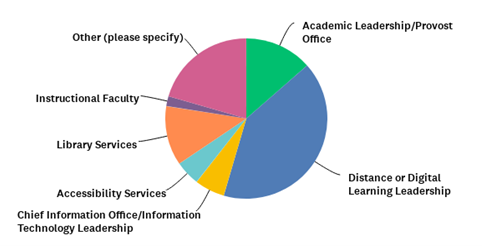Survey on New DOJ Regulation on Accessibility of Web Information and Services
Published by: WCET | 8/29/2024
Tags: Accessibility, Digital Learning, Distance Education, Managing Digital Learning, Regulation, State Authorization, WCET
Published by: WCET | 8/29/2024
Tags: Accessibility, Digital Learning, Distance Education, Managing Digital Learning, Regulation, State Authorization, WCET
On August 2, WCET published our post, Accessibility in the Spotlight: Department of Justice Regulations, on the Department of Justice (DOJ) final rule revising the regulation implementing Title II of the Americans with Disabilities Act (ADA). The new regulation establishes requirements for making accessible the services, programs, and activities offered by state and local government entities to the public through the web and mobile applications. In the post, we provided an overview of the updates made in the regulation, the compliance timeline, and a preview of additional resources and events focused on accessibility and this regulation that WCET is planning.
In order to inform ongoing plans to support WCET members and others in this complex work, we conducted a brief survey Iast month to better understand institutional awareness around the revised regulation. WCET collaborated with both the State Authorization Network and NWHEAT (a collaboration of the Northwest Academic Computing Consortium and the Orbis Cascade Alliance) to solicit responses.
We received 205 responses representing a range of institutions/organizations, with the highest number of respondents at four-year publics that primarily offer baccalaureate and/or graduate degrees (47%), then two-year publics that primarily offer associate degrees (35%). Nearly half (48%) of institutions/organizations responding reported having Fall 2023 headcount enrollments of at least 10,000.
We also asked respondents what office/service within the institution they represent:

Respondents were asked if they were generally aware of the new regulation. An overwhelming majority (81%) answered “Yes.” When asked if their institution has taken any action to begin addressing compliance, a majority (61%) responded “Yes.”
Those who haven’t taken action or didn’t know did indicate that, in general and at some point, they have taken some sort of action to address accessibility requirements for web and mobile app usage by students, faculty, and staff, with the most common being consulting/working with campus Accessibility Services (45%) and working with vendors on accessibility (38%).
A majority or near majority of respondents who indicated that their institution has taken action to begin addressing compliance are in the initial planning phases, such as:
The highest percentage (17%) of the actions above that have been fully addressed or nearly done is for consulting/working with campus Accessibility Services. A key (if not surprising) takeaway here is that Accessibility Services is crucial to this work.
Many institutions clearly are working to grapple with what is needed for compliance, especially in the face of a relatively short timeline. Our survey surfaced the following key needs to support this work: staffing, training, faculty buy-in, vendors and procurement, and legal issues.
Identified staffing needs included:

One respondent identified a need for “[s]ample updated language for job descriptions that incorporate the skill of authoring accessible content.
It is everyone’s job,” another for “new positions to serve as leadership” for this work.
Numerous respondents indicated that professional development for staff, faculty, and administrators was crucial to assist in understanding and compliance.
One respondent suggested, “This is a huge undertaking on the instructional side to make sure faculty create accessible course materials. The training involved will be extensive.” Others suggested that this training needs to be mandated, given the circumstances.
The survey made it clear that faculty are considered crucial to ensuring compliance; however, many respondents expressed concerns that faculty members don’t understand their responsibilities around accessibility. There does seem to be a recognition of the extent of work that this would take: “Our instructors already are largely unaware of accessibility standards and trying to mandate this level of compliance in a short time, and then vetting/reviewing their materials to ensure compliance, is a very, very large lift for our already over-taxed faculty.” Another echoed such concerns: “So many files added to LMS and so many courses. Extremely time-consuming to review data and zero in on the inaccessible files!” But one respondent bluntly admitted, “The fear is people [faculty] will be deleting content.”
Respondents requested resources to assist in communicating with third-party vendors. Others suggested that a national list of vendors – particularly those who understand the often unique needs of higher education – that have had accessibility conformance reviews performed on their software would be helpful. As one stated, “I know there are some publicly available repositories of test results and VPATs [Voluntary Product Accessibility Template] but it would be nice to have a one-stop shop!” Challenges around existing multi-year contracts with vendors, who may not currently ensure accessibility of their products to the standard required in the regulation, also were mentioned.
The need for legal guidance, particularly around the exceptions in the regulation, was another topic of interest. One respondent asked, “[f]or our conversations with legal, help [to] determine how the new guidelines impact the risk profile of accessibility to help us compare it to other risks on campus.” Another suggested: “I think being able to break down the legal aspects into practical applications would be very helpful.”
This post only scratches the surface of the myriad of institutional and organizational needs to comply with the revised regulation, from a better understanding of the regulation itself as well as accessibility standards, to models of plans from other institutions and guidance for private colleges and universities on how future regulations may affect them. While work toward compliance may seem daunting, it should result in increased accessibility for all students . As one respondent argued: “I would like to see a shift from a ‘compliance mindset’ to a[n] ‘equity mindset’ with my faculty and staff. It’s not about lawsuits, it’s about providing access to a quality education for all!”
WCET is committed to developing resources to assist with these topics and others, and we will soon publish additional Frontiers posts from accessibility experts in the field. We held a very successful Closer Conversation event about the regulation for members, and we recently published Access for All: New Accessibility Rules For Public Entities. This resource outlines the regulation in greater detail and includes a flowchart highlighting key questions to guide an institution’s processes to ensure compliance. This resource is only available to WCET and SAN members. Click the links below to download.
Post authored by Judith Sebesta and Van Davis
Founder and Principal, Sebesta Education Consulting LLC